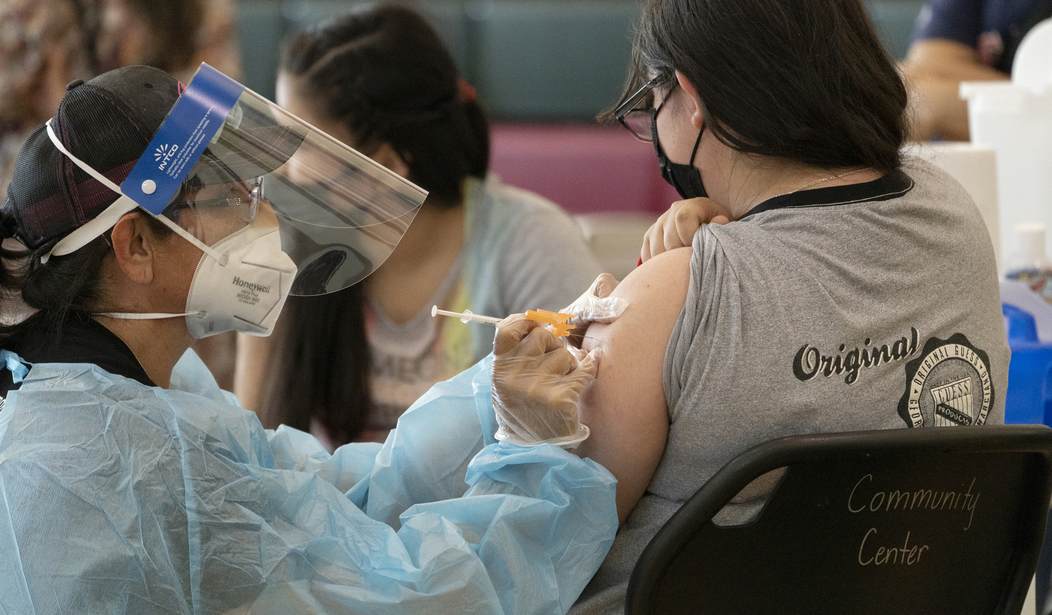It is difficult to believe that any college administrator is even contemplating requiring college students to get an Omicron booster shot. Luckily experts with the American College Health Association’s (ACHA) Campus COVID-19 Vaccination and Mitigation (CoVAC) Initiative believe students will not be required to get the jabs. Instead, college administrators will subject them to increased COVID-19 vaccination-education efforts. Let’s hope they include the ethical arguments against boosters for young adults made by nine leading physicians and scientists in a new preprint.
A group, including familiar faces such as Dr. Marty Makary, Dr.Vinay Prasad, and Dr. Tracy Beth Hoeg, reviewed the data on vaccine efficacy, immunity from prior infection, and vaccine risks using age stratification. After the review, they found five ethical arguments against college-aged students receiving the Omicron booster:
- No formal risk-benefit assessment exists for this age group.
- Vaccine mandates may result in a net expected harm to young people.
- Expected harms from the vaccine are not outweighed by public health benefits, given the modest and transient effectiveness of vaccines against transmission.
- US mandates violate the reciprocity principle because the law will not reliably compensate for rare serious vaccine-related harms due to gaps in current vaccine injury laws.
- Mandates create broader social harms.
After reviewing CDC and trial data, the team estimated that colleges must boost 22,000 – 30,000 previously uninfected adults aged 18-29 with an mRNA vaccine to prevent one Covid hospitalization. Omicron was reportedly the most infectious variant to date and did not cause prominent symptoms in many who became infected. Because testing became something people could do at home, and many people with mild symptoms may not have tested, it is impossible to know how many Americans remain Covid naive.
The data also showed that booster mandates might cause net harm. For every Covid hospitalization prevented in previously uninfected young adults, the team projected 18 to 98 serious adverse events. These included 1.7 to 3.0 booster-associated myocarditis cases in males and 1,373 to 3,234 cases of adverse reactions severe enough to interfere with daily activities. That is a lot of suffering and potential disability to prevent a single hospitalization.
Recommended: A Proposal Is Set to Add ‘Gender Identity’ to Title IX. You Have Until Midnight EDT To Comment
After a full review, the professionals called to end mandates for all students. The paper calls for rolling back all of the existing policies that still require the initial two-dose series at the university level as well as in primary and secondary schools:
The arguments presented above are relevant not only to 3rd, 4th, or 5th dose booster mandates but also to university or school policies that maintain primary two-dose Covid-19 vaccine mandates in 2022 in the face of high rates of previous SARS-CoV-2 infection. Two dose mandates are being upheld in at least 1000 universities and colleges across the United States, far more than the 300 or so maintaining booster mandates, and also some primary and secondary schools which instituted mandates then extended the deadline when it was apparent that serious inequities in access to education would result. It is even harder to justify a two-dose primary vaccine mandate in late 2022 than when such policies began in mid-2021.
The analysis showed that the peak age for myocarditis or pericarditis after vaccination was college-bound students between 17 and 19. The paper notes that maintaining these initial dose requirements could represent a status quo bias. Aside from the argument made in the study, it makes no sense to vaccinate anyone against a variant that is no longer prevalent. It makes even less sense when the vaccine does not prevent illness or transmission of the virus.
Because mandates are associated with broader social harms according to the data, the authors assert that policymakers displayed a profound lack of transparency because public health officials never updated the sole publicly available risk-benefit analysis for the Omicron variant. They also called for updates to the strong statements in support of mandates made in 2021 by organizations such as the Association of Bioethics Program Directors in North America and the American Civil Liberties Union.
Ultimately, the authors decided Covid vaccine mandates don’t make much sense in any setting and gave policymakers a laundry list of items to complete to restore confidence in public health:
These findings have implications for mandates in other settings such as schools, corporations, healthcare systems and the military. Policymakers should repeal booster mandates for young adults immediately, ensure pathways to compensation to those who have suffered negative consequences from these policies, provide open access to participant-level clinical trial data to allow risk- and age-stratified harm/benefit analyses of any new vaccines prior to issuing recommendations and begin what will be a long process of rebuilding trust in public health.
The next question should be why the CDC is spending taxpayer dollars to put out advertisements for Pfizer’s Covid booster jab explicitly targeted to young people. Since when did the government bureaucracy become Big Pharma’s marketing department, and how do we make it stop? Since the CDC admitted it needs reform, Congress should ensure the agency gets some. And the solution cannot come from inside the agency.










Join the conversation as a VIP Member